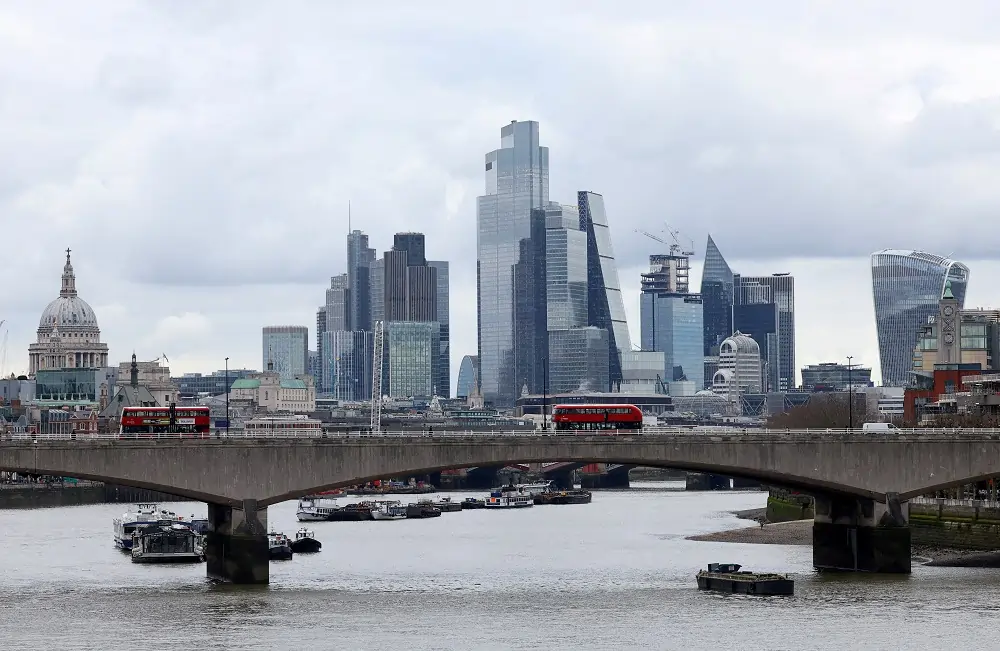
By Naomi Rovnick and Anousha Sakoui
LONDON (Reuters) – Investors are looking at UK markets as a potential haven as political uncertainty rises in the U.S. and elsewhere in Europe, in what could mark a stunning turnaround for a country that appeared to have lost its traditional appeal to global capital.
A landslide election victory for Britain’s centre-left Labour government last week offers the prospect of predictable policy and improved trade with the European Union to reboot an economy that has struggled since the 2016 Brexit vote.
Meanwhile, parliamentary gridlock in debt-laden France has stirred memories of previous euro zone crises, and investors are scrambling to guess what former U.S. President Donald Trump regaining the White House might mean for markets.
Britain’s economy is picking up, and some bankers expect a revival for UK stock markets shrivelled by relentless selling during years of turbulence under successive Conservative governments.
BlackRock Investment Institute, a research arm of the world’s largest asset manager, said on Tuesday it was bullish on UK stocks, potentially heralding a mood shift among major global institutions that have cooled on Britain since 2016.
But even those moving funds into the UK warned that its haven appeal may be short lived unless new Prime Minister Keir Starmer pulls off a bold plan to boost living standards without straining the nation’s stressed finances further.
“The (UK) election improves things at the margin and the uncertainty on Europe driven by France means there could be a honeymoon period for Britain for a bit,” said Pictet Wealth Management chief investment officer César Pérez Ruiz.
“The market is going to be asking for more detail on fiscal spending and (Starmer) hasn’t given us a lot of information.”
Pérez Ruiz said he sold some European corporate debt because of French political risk and bought UK equivalents instead, but may not hold the position beyond six months.
GREEN SHOOTS?
Investors have kept pulling money out of UK equity funds and stock market trackers since the July 4 election, daily data from information provider Lipper showed.
Yet there are also some positive signs.
After a dearth of London listings, potential large offerings are on the horizon from the likes of Shein and De Beers, with some bankers predicting the UK market will revive more broadly next year. On Thursday, the UK market regulator fast-tracked a swathe of listing rule changes in a bid to encourage more IPOs.
London’s share of European IPO volumes dwindled to just 1% in the year to mid-May, down from 28% in the same period in 2021 when the market boomed.
“There’s a couple of reasons to be positive and certainly relatively more positive about the UK than other regions,” said Peel Hunt equity capital markets head Brian Hanratty.
“I don’t want to say it is like a dam breaking.”
He had observed companies holding early stage investor meetings and more discussions with accountants about IPOs, he added.
Some big investors are turning more optimistic too.
“We see a virtuous cycle taking hold,” Fidelity International head of multi-asset Salman Ahmed said, if Labour rebuilds EU trade links and revives business spending. Fidelity has a neutral view on Britain although some funds are increasing exposure.
Matt Evans, portfolio manager at NinetyOne, said UK companies he meets with were readying investment projects that they had delayed under the Conservatives.
DEBT JITTERS
Weak UK public finances remain a source of concern, as state borrowing approaches 100% of economic output, and the 2022 market chaos unleashed by Conservative Prime Minister Liz Truss’ under-funded mini-Budget remains fresh in memories.
Labour wants to attract private investment into infrastructure and housing, potentially boosting 2024 growth beyond the 0.7% economists polled by Reuters expect.
Gilts had short-term support from expected Bank of England rate cuts but the UK was not a debt market haven unless Labour could prove an untested commitment to budgetary caution, said James Athey, fixed income manager at London investment group Marlborough.
While off highs hit in 2023, Britain’s 10-year bond yield has still risen 60 basis points this year to 4.15%, underperforming U.S. and German peers.
BlueBay Asset Management chief investment officer Mark Dowding said he would not increase UK exposure while inflationary pressures remained.
In another sign of some caution, London’s FTSE-100 index,, valued on a price-to-earnings ratio almost 50% below that of U.S. stocks, has underperformed global benchmarks so far this month.
“The (UK) risk-reward is pretty favourable,” BNP Paribas head of equity strategy Dennis Jose said.
But as for capital coming back? “Not yet. It will take a little more time.”
(Reporting by Naomi Rovnick and Anousha Sakoui. Additional reporting by Dhara Ranasinghe and Yoruk Bahceli; Editing by Dhara Ranasinghe and Mark Potter)


